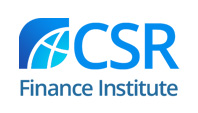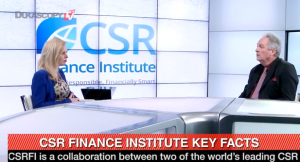Geneva Training for Business on CSR & Sustainability
Comments Off on Geneva Training for Business on CSR & SustainabilityBusiness Executive Diploma
in
Corporate Social Responsibility
and
Sustainability
developed by
Professor Michael Hopkins
CSR FINANCE INSTITUTE ( www.csrfi.com )
Background
CSR and Sustainability are seen as a whole system in the workings of a company – what we call a 360 degrees approach using a multi-stakeholder model – the ‘Hopkins CSR Model’. To elaborate each of the dimensions ten highly inter-related courses are offered as a package or taken individually. The Diploma consists of ten 2.5 days modules plus a project or short thesis. All the below is based upon the course delivered successfuly over 6 years at the University of Geneva which has now been absorbed into their MBA program. Companies or institutions, in discussion with CSRFI and an MOU, may choose a shorter version for a 2/3 workshop that provides a ‘taster’ for the Diploma. The course is also accompanied by Michael Hopkins’ Text Book on CSR and Sustainability that will appear in September 2015 with the publisher Greenleaf, UK. The introductory part can also be followed in the CSR and Sustainability Online Course also developed by Michael Hopkins and can be found on this website.
I. Introduction: The Director – the Vision – the Courses
Professor Michael Hopkins, has been globally renowned as a CSR expert for over 20 years and was ranked among the top 100 thought leaders across the world in 2013[1]. Well ahead of his time, Michael identified the pivotal roles in business of Corporate Social Responsibility (CSR), corporate sustainability and sustainable finance in the economy and their growing significance worldwide. He is one of the leading academics in his field and has to date authored thirteen academically renowned books of which two on CSR and sustainability.
Initially coming from the corporate sector (IBM and ITT), Michael also worked at the United Nations (ILO, UNDP, WFP) and the World Bank. His academic career path spans QeH Oxford, Geneva, Middlesex, Brunel, and George Mason Universities (the latter three as full Professor). As a PhD economist he has a strong focus on measurement, employment issues and executive education, especially in emerging markets. His 13th book, “Corporate Social Responsibility and Sustainability – From the Margins to the Mainstream: A Text Book”, will be published in Nov, 2015 by Greenleaf, UK.
Michael is CEO and Founder of the CSR and Finance Institute (CSRFI – www.csrfi.com), an internationally recognized CSR, sustainability and sustainable finance education program. Certified by the George Mason University in Washington DC (www.gmu.edu), where Michael is Adjunct Professor, CSRFI designs training course workshops for high-level executives around the world. He has developed several e-online coursesclose cooperation with the World Bank and, more recently, with the United Nations Institute for Training and Research (UNITAR – www.unitar.org), a worldwide international organization that promotes UN research and sustainable development training.
CSRFI provides outstanding executive CSR, sustainability and sustainable finance training to business professionals in various economic sectors and disciplines. The training course content is based both Michael’s long standing academic work and his consulting with business. His training has a strong focus on a wide array of practical case studies and recent research and information. For the workshops Michael will be joined by members of his team of experts drawn from academia as well as the cororate sector and all have a wide variety of in-depth experience in the different subject matters and corporate environments.
II. CSR AND SUSTAINABILITY COURSE MODULES
CSRFI offers a complete set of 10 CSR, sustainability and sustainable finance training modules for professionals who wish to develop their knowledge and understanding in these domains. The course modules are aimed at executives in management, legal departments, accounting, finance, etc. with the objective to further hone as well as develop their knowledge and skills in this area.
Each of CSRFI’s carefully selected expert trainers has extensive professional experience with leading companies in their dedicated specialized area of CSR, finance, or other required field of expertise.
The teaching is highly interactive with a minimum of lecturing and a maximum of interactive discussion with many case studies from real life situations. The expert faculty are joined by industry leaders with vast experience and great willingness to expose their ideas. Previous speakers included executives from Nestle, Shell, Intel, WEF, WBSCD, Novartis, Unilever, Pictet, Lombard-Odier, IBM, SGS, UBS, WWF, BSCI, SA8000 etc, as well as the United Nations (ILO, UNHCR, UNICEF, UNITAR, World Bank etc.).
Each two and a half day module or business seminar may be conducted on a Thursday evening, all day Friday and all day Saturday thereby taking into consideration the schedule of busy executives.
According to companies’ specific needs, CSRFI can also offer tailor made workshops covering a range of topics from the various 10 modules listed next in section “III. The Workshops in Brief”.
III. The Workshops in Brief
Initial Preparation
Each registrant will be offered the chance to take the e-online course prepared by Dr. Michael Hopkins, as preparation for the various modules. This will be included in the total package for those who take all modules or a small charge for those who take only one or more modules on an a la carte basis.
Part One Theoretical Dimensions
Modules
1.CSR Definition and Impact Measurement: This course module presents and discusses the main theories of CSR and Sustainability based upon both recent and historical literature, followed by an in-depth investigation into the challenges and techniques available to measure the economic, environmental, social impact of corporate CSR policies. The aim is to start with the academic yet move quickly into how the concepts are used in business and other institutions. Why this module for business executives? The discussion focuses on why the concepts are useful for business and how they link to the business case and materiality.
2.Business Ethics: Participants will gain an understanding of business ethics concepts and the managerial tools available to develop responsible businesses that can drive value and create competitive advantages. Ethical dilemmas will be discussed using real-life case studies followed by a presentation of what are the best ethical guidelines and how are they being used in practice. Why this module? The ethics of business and how to avoid unethical pitfalls leading to rapid reputation loss are of huge concern to business these days especially after the collapse of so many financial companies from ethical challenges.
Part Two Business in Society
Modules
3. Introduction to Global Reporting Initiative (GRI) and Other Certification: The GRI has emerged as the pre-eminent CSR/Sustainability Reporting methodology. Professor Hopkins leads a consortium to certify trainers in the latest GRI standards and will share this experience with participants. The course module will also cover other standards and whether or how, GRI links to them. An example is the Integrated Reporting approach that includes financial reporting. Why this module? Does business really need to report on its CSR and Sustainability and, if so, how best to do that succinctly while ensuring being in line with the best industry wide practices.
4.Stakeholder Engagement and Practice: This module will introduce participants to the concept of stakeholder theory, as well as working through difficulties and practical approaches to stakeholder selection and engagement. Areas covered also include transparency, effective communication and reporting. Why this module? The tricky area of ensuring key stakeholder feedback while being as efficient as possible in doing so needs to be mastered so as to reduce corporate time in carrying out such activities.
5.Human Rights and Social Finance: The course module works progressively from a consideration of what human rights are through to internationally recognized labor standards and the perspectives of investors. The emphasis is on how companies working internationally, including in some of the most challenging national and local environments can adopt best practice to adhere to international law and regulatory constrains whilst marketing their operations to investors in a value-enhancing way. Why this module? Many companies wish to enhance their social image especially in human rights but also need to know what, or even whether, there is a business case in doing so.
Part Three Sustainable Development
Modules
6.Socially Responsible, Sustainable Investments: This module looks at the rapidly moving world of socially responsible investment (SRI): what it means, how it is defined and measured, who does it and how successfully. Why this module? SRI forms one of the largest sets of private investment, so can one do well by doing good in investment?
7.CSR, Sustainability, and International Development: The course module focuses upon CSR in international development and its practical implications. It presents a methodology that allows corporations to judge how successful their interventions in areas such as Corporate Social Investment (CSI) have been. It also links to some of the main development theories that have been driving the global agenda in recent years, and hold a session on CSR/Sustainability and how they are used in SMEs. Why this module? Most large companies working in emerging market economies wish to help the recipient country and, of course, hope that there is a business case and something we shall examine with case studies in this module.
8.Supply and Value Chains: Corporations understand that their consumers require some knowledge of who their suppliers are as well as the CSR of these suppliers. This module will examine the main supply chain standards and also introduce participants to some of the main standard setting bodies such as BSCI, Fairtrade, FLA, FSC, SA8000, etc. It will explain the context and significance of the ISO 26000 framework, how it fits with other standards and guidelines, such as GRI, the UN Global Compact, OECD Multinational Guidelines, ILO Principles and SA8000. Practical examples of how companies have implemented the standard will be provided. Why this module? Increasingly companies want to ensure they are minimizing risk through proper control and understanding of their supply chains. This module will focus on the advantages as well as some of the pitfalls.
9.International Best Practices in Corporate Greening: This executive-level seminar is designed to give senior executives a strategic overview of the current state of green strategies and examines how greening initiatives have been applied in different industries and countries. Why this module? It begins by demonstrating not only are corporate greening practices practices better for the environment, but they also make good business sense as the module will show.
Part Four Strategic Corporate Social Responsibility
Modules
10.CSR, Strategy and Communication: How does one embark on developing and embedding a strategic CSR program that a) responds to the expectations of internal and external stakeholders and b) is reflected in a corporate strategy for sustainability that is seen as credible rather than simply a PR exercise? Why this module? The course module is geared towards participants interested in how to best communicate the good that their company has done to the wider world. The module ends with a recap of the whole course with a final focus on a worked out and tested CSR/Sustainability 15 point strategy that can be implemented in your company.
IV. Contact Details
For further information on the content and organisation of the seminars, please contact us on enquiries@csrfi.com .
V. Pricing
Each module lasts two and a half days and may be taken individually. The charge for each module is CHF1997.00 in Switzerland (but less elsewhere) or if signed for all ten modules the charge will be CHF11.997.00 An Early Bird rate of one month before the announced start of the course will attract a 20% discount. Participants from the same company will received an additional 10% reduction for each module or total package.
VI. Certification
VII. Networking and Interactions
Perhaps one of the most exciting aspects of our courses is learning and interaction with other busy executives. We encourage this both through our wide network of former graduates and, especially, through our monthly CSR Meetups now being held in ten locations and others in the pipeline…see http://csrfi.com/csr-meetups where we now number around two thousand top professionals.


